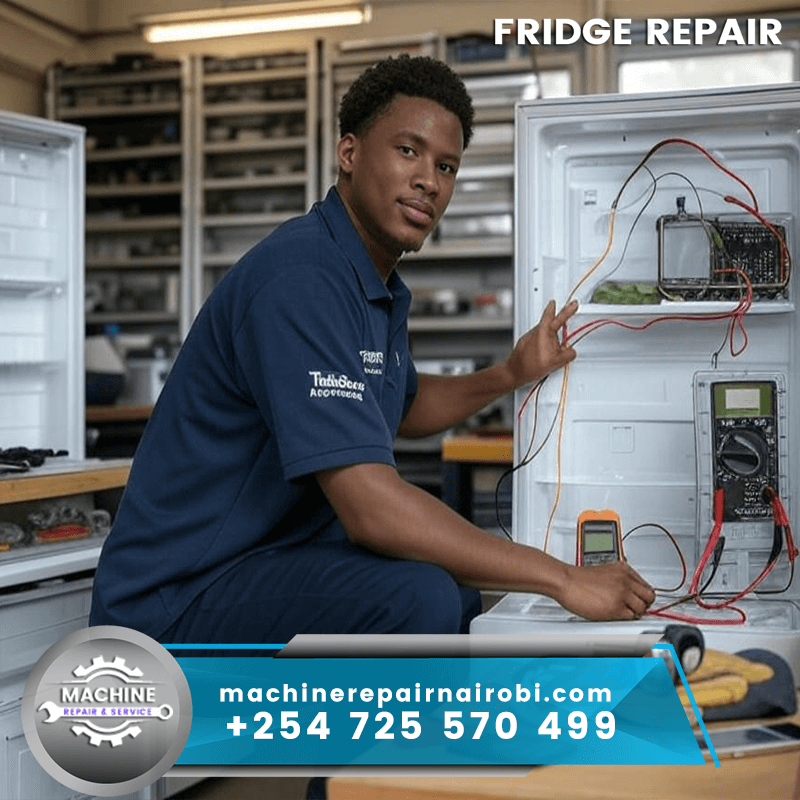How Can I Tell If My Fridge Needs More Refrigerant?
How Can I Tell If My Fridge Needs More Refrigerant? Refrigerant is the lifeblood of your refrigerator’s cooling system, circulating through coils to absorb and dissipate heat, keeping your food fresh. When refrigerant levels drop—due to leaks or natural depletion—your fridge’s performance suffers. Recognizing the signs of low refriger…
0725570499
How Can I Tell If My Fridge Needs More Refrigerant?
Refrigerant is the lifeblood of your refrigerator’s cooling system, circulating through coils to absorb and dissipate heat, keeping your food fresh. When refrigerant levels drop—due to leaks or natural depletion—your fridge’s performance suffers. Recognizing the signs of low refrigerant can save you from costly repairs or food spoilage. In this informative guide, Machine Repair Nairobi explains how to tell if your fridge needs more refrigerant and what steps to take next.
Understanding Refrigerant and Its Role
Refrigerant is a specialized chemical compound that transitions between liquid and gas states to facilitate cooling. In a properly functioning fridge, it remains sealed within a closed-loop system, meaning it shouldn’t need frequent refilling. However, leaks or manufacturing defects can reduce refrigerant levels over time. Knowing the symptoms of low refrigerant is key to maintaining your appliance’s efficiency.
Signs Your Fridge May Need More Refrigerant
Low refrigerant manifests in several noticeable ways. Here are the primary indicators to watch for:
- Insufficient Cooling
If your fridge struggles to maintain a cold temperature—despite the thermostat being set correctly—it could signal low refrigerant. Check if the freezer is above -18°C or the fridge compartment exceeds 5°C. Warm shelves or melting ice are telltale signs. - Warm Evaporator Coils
Open the freezer section and feel the evaporator coils (typically at the back). Normally, these should be cold and frosty. If they’re warm or only slightly cool, insufficient refrigerant may be the culprit. - Hissing or Bubbling Sounds
A leaking refrigerant line can produce faint hissing or bubbling noises as the gas escapes. Listen closely near the back of the fridge or freezer for unusual sounds that persist. - Compressor Runs Constantly
The compressor, located at the fridge’s rear, pumps refrigerant through the system. When levels are low, it may run non-stop to compensate, leading to higher energy bills and a warm fridge interior. - No Frost on Coils
Healthy refrigerant levels produce a light frost layer on the evaporator coils. If the coils are bare or only slightly moist, it suggests the system isn’t circulating enough refrigerant.
Steps to Confirm the Problem
Before concluding your fridge needs more refrigerant, follow these steps to rule out other issues:
- Check the Thermostat
Ensure the temperature settings haven’t been accidentally adjusted. Set the fridge to 3-5°C and the freezer to -18°C, then monitor for 24 hours. - Inspect Airflow
Blocked vents or dirty condenser coils (at the back or bottom of the fridge) can mimic low refrigerant symptoms. Clear any obstructions and vacuum the coils with a brush attachment. - Examine the Door Seal
A faulty gasket lets warm air in, forcing the fridge to overwork. Test the seal by closing the door on a piece of paper; if it pulls out easily, the seal may need replacing. - Listen for Compressor Activity
A silent compressor could indicate a power issue, while constant running paired with poor cooling points toward refrigerant trouble.
If these checks don’t resolve the issue, low refrigerant becomes a likely suspect.
Why You Shouldn’t Add Refrigerant Yourself
Adding refrigerant might seem like a quick fix, but it’s not a task for amateurs. Here’s why:
- Specialized Equipment: Refilling requires precise tools like manifold gauges and a vacuum pump to measure and inject refrigerant accurately.
- Safety Risks: Refrigerants are hazardous chemicals that can cause injury if mishandled.
- Leak Detection: Simply topping up refrigerant without fixing an underlying leak wastes time and money, as the problem will recur.
Only certified technicians, like those at Machine Repair Nairobi, should handle refrigerant-related repairs.
What to Do If You Suspect Low Refrigerant
If the signs point to low refrigerant, take these steps:
- Turn Off the Fridge
Unplug the unit to prevent strain on the compressor while you arrange for professional help. - Contact a Professional
Call a trusted repair service like Machine Repair Nairobi. Describe the symptoms—poor cooling, hissing sounds, or warm coils—so the technician arrives prepared. - Prepare for Inspection
Clear space around the fridge and note any observations (e.g., when the issue started) to assist the repair process.
A qualified technician will check for leaks, repair them, and recharge the system with the correct refrigerant type and amount.
Preventing Refrigerant Issues
While you can’t always prevent leaks, these habits can reduce strain on your fridge’s cooling system:
- Regular Cleaning: Dust condenser coils every six months to maintain efficiency.
- Avoid Overloading: Don’t overcrowd shelves, as this restricts airflow and overworks the system.
- Schedule Maintenance: Annual check-ups by professionals can catch small issues before they escalate.
Contact Machine Repair Nairobi for Help
Determining if your fridge needs more refrigerant requires careful observation and, often, expert intervention. At Machine Repair Nairobi, we specialize in diagnosing and resolving refrigerant issues, ensuring your fridge runs efficiently. If you’ve noticed poor cooling, strange noises, or other signs, don’t wait—reach out to us today. Our skilled technicians in Nairobi are ready to restore your appliance to peak condition.
Machine Repair Nairobi – Expert solutions for all your fridge repair needs.
Remarkable Fridge repair in Nairobi | Fast and Affordable
Contact Us
We wait to hear from you and we are eager to let you know about our solutions! Reach out today for inquiries, Information and service Requests!
-
+254725570499
You can reach us through our official number .
-
hello@machinerepairnairobi.com
hello@machinerepairnairobi.com
You can also reach us through mail.